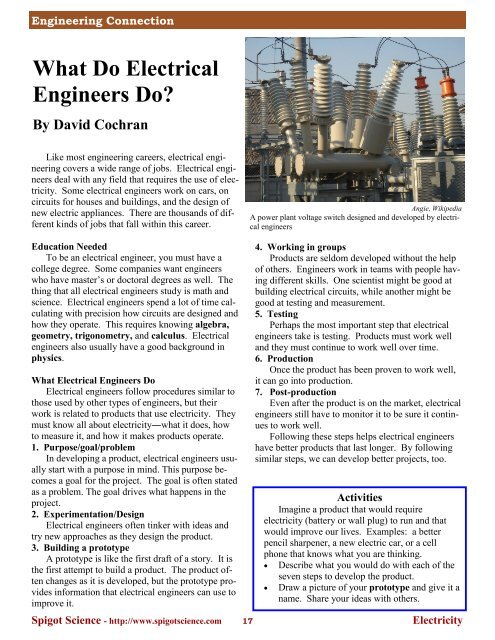Electricity - Spigot Science
Electricity - Spigot Science
Electricity - Spigot Science
Create successful ePaper yourself
Turn your PDF publications into a flip-book with our unique Google optimized e-Paper software.
Engineering ConnectionWhat Do ElectricalEngineers Do?By David CochranLike most engineering careers, electrical engineeringcovers a wide range of jobs. Electrical engineersdeal with any field that requires the use of electricity.Some electrical engineers work on cars, oncircuits for houses and buildings, and the design ofnew electric appliances. There are thousands of differentkinds of jobs that fall within this career.Angie, WikipediaA power plant voltage switch designed and developed by electricalengineersEducation NeededTo be an electrical engineer, you must have acollege degree. Some companies want engineerswho have master’s or doctoral degrees as well. Thething that all electrical engineers study is math andscience. Electrical engineers spend a lot of time calculatingwith precision how circuits are designed andhow they operate. This requires knowing algebra,geometry, trigonometry, and calculus. Electricalengineers also usually have a good background inphysics.What Electrical Engineers DoElectrical engineers follow procedures similar tothose used by other types of engineers, but theirwork is related to products that use electricity. Theymust know all about electricity―what it does, howto measure it, and how it makes products operate.1. Purpose/goal/problemIn developing a product, electrical engineers usuallystart with a purpose in mind. This purpose becomesa goal for the project. The goal is often statedas a problem. The goal drives what happens in theproject.2. Experimentation/DesignElectrical engineers often tinker with ideas andtry new approaches as they design the product.3. Building a prototypeA prototype is like the first draft of a story. It isthe first attempt to build a product. The product oftenchanges as it is developed, but the prototype providesinformation that electrical engineers can use toimprove it.4. Working in groupsProducts are seldom developed without the helpof others. Engineers work in teams with people havingdifferent skills. One scientist might be good atbuilding electrical circuits, while another might begood at testing and measurement.5. TestingPerhaps the most important step that electricalengineers take is testing. Products must work welland they must continue to work well over time.6. ProductionOnce the product has been proven to work well,it can go into production.7. Post-productionEven after the product is on the market, electricalengineers still have to monitor it to be sure it continuesto work well.Following these steps helps electrical engineershave better products that last longer. By followingsimilar steps, we can develop better projects, too.ActivitiesImagine a product that would requireelectricity (battery or wall plug) to run and thatwould improve our lives. Examples: a betterpencil sharpener, a new electric car, or a cellphone that knows what you are thinking. Describe what you would do with each of theseven steps to develop the product. Draw a picture of your prototype and give it aname. Share your ideas with others.<strong>Spigot</strong> <strong>Science</strong> - http://www.spigotscience.com 17 <strong>Electricity</strong>


